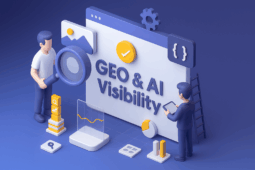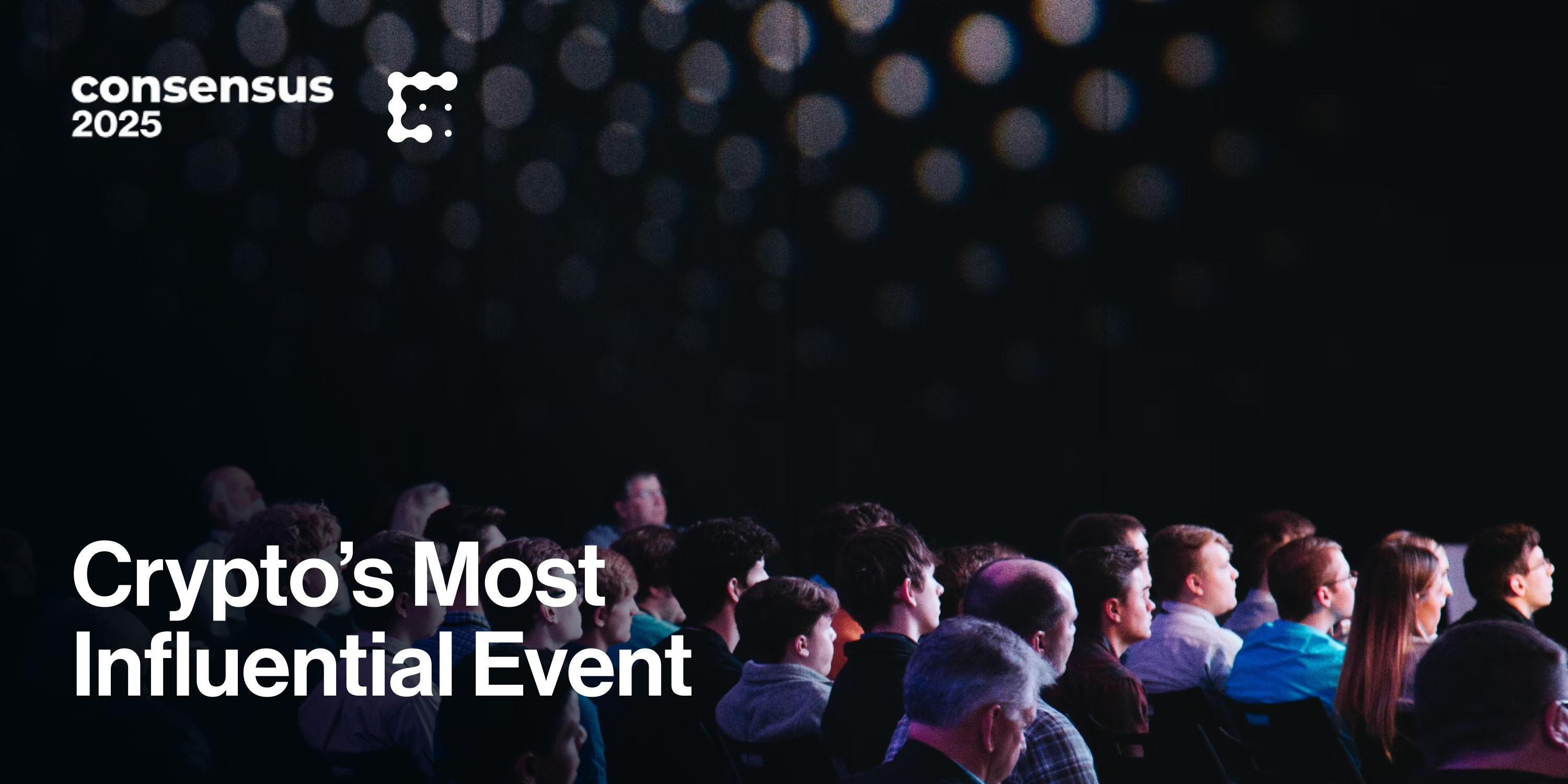share
The metaverse craze has been taking the world by storm as of late. And yet, most people have never heard of it or heard but couldn’t find a reason to care enough. In many cases, the reason is a lack of adequate metaverse marketing for many projects. In this article, we’ll try to explore how that could be fixed and consider some of the most popular examples of metaverses today.
What Is the Metaverse?
There is an ongoing metaphysical debate surrounding the term “metaverse”. The simpler way to put it would be something like this: a metaverse is a collective virtual shared space where people can engage with each other and benefit from doing so.
What Can You Do in a Metaverse?
Metaverses are created to expand real-life social experiences. You can think of them as the next step in the evolution of social networks.
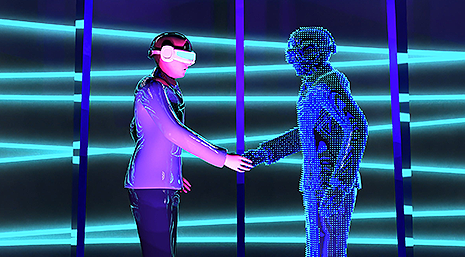
Users of a metaverse interact with its digital world and each other through virtual avatars. Metaverse avatars are usually deeply customizable and serve as a means of self-expression.
Is a Metaverse a Game?
Metaverses can be compared to MMOs like World of Warcraft and other massively multiplayer games. However, there are some key differences. A metaverse is mainly based on the blockchain and fueled by cryptocurrencies and NFTs.
Crypto and non-fungible tokens are the cornerstones of a metaverse experience; besides, a metaverse has no pre-defined ‘gameplay’. In video games, players are given specific tasks set by the developers and are offered specific rewards for completing them. A metaverse can be compared to an open-world game, but it’s the ‘players’ who decide what they can do and how they should reward each other.
One of the most prominent examples of a blockchain metaverse is Decentraland, based on the Ethereum blockchain.

A typical metaverse:
It is always active and never stops;
Exists in real-time and is synced with the physical world;
Offers its users full agency over their activities and assets;
Is a self-contained and fully functioning universe;
Spans different platforms and is interoperable;
Lives off user-generated content as opposed to developer-created.
Biggest Metaverses
Here are some examples of the most prominent metaverses to date:
Decentraland
The Ethereum-based Decentraland is pretty much the epitome of a metaverse today.

In this virtual world, users can buy and explore virtual NFT plots of land and build just about anything on them using the native toolkit with countless usable objects and tools. On their land, users can set up stores, organize and attend events, make friends and socialize, have fun and play games and, of course, make money trading NFTs.
Facebook Metaverse
Inspired by the surge in the popularity of the metaverse, Mark Zuckerberg, without much hesitation, renamed the Facebook parent company into Meta and decided to make it from a social media platform into a worldwide metaverse hub.

The vision entailed an infinitely customizable global shared virtual space that’s driven by AR (Augmented Reality) and VR (Virtual Reality) technology. Users would be given the freedom to do just about anything, in any way they like, including work and business.
Roblox
Although not based on the blockchain, Roblox is one of the key examples of a properly implemented metaverse. At its core, Roblox is an online video game sandbox platform where users can create their own video games from scratch using a vast built-in toolkit and an easy-to-learn programming language called Lua.

Users who create games on Roblox earn an internal currency called Robux, which they can then exchange for real-world money. Roblox has already partnered with some of the world’s biggest brands, including the NFL, which decided to make its own metaverse game in anticipation of the 2022 Super Bowl.
Axie Infinity
Axie Infinity’s Lunacia is a metaverse aimed at expanding and enriching the experience of Axie Infinity players while also providing more valuable rewards. The mechanism is similar to Decentraland: players can buy, explore, loot and harvest virtual land parcels in a kingdom called Lunacia.

Lunacia is an open world that players can freely explore and face against challenging monsters not seen in the base game. As a result, players get higher rewards in SLP tokens and a prospect of winning land parcels that they can sell on the Axie Infinity Marketplace.
The Sandbox
The Sandbox, as the name suggests, is an open-world sandbox metaverse where people can build their own games.
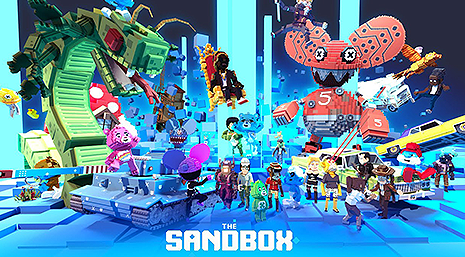
The main goal of the Sandbox is to enable a worldwide blockchain-based gaming community where people would be encouraged to create, share, and monetize their own gaming experiences. Users can build their own games from scratch using the in-house toolkit with purchasable assets. For that, The Sandbox can be considered the blockchain version of Roblox.
There are also land parcels that users can buy and host their gaming experiences on. Naturally, all assets in the Sandbox come as NFTs. The ecosystem runs as a DAO and is fueled by the SAND token.
Metaverse Marketing: How It Can Benefit You
If you see the future of your brand or business on the blockchain, then your marketing strategies must include expanding into the metaverse.
Marketing in the metaverse has much in common with marketing in the physical world, but there are some serious advantages you should consider.
Immersion & Mixed Reality
The #1 way metaverse marketing is next-level is the immersive experiences it can offer. Studies show that only 3% of all content online is interactive. Internet users have been trained to consume content passively, but metaverse marketing can flip the whole thing on its head.
With the aid of Augmented reality (virtually enhanced physical reality) and Virtual reality headsets, metaverse marketing can take forms previously unheard of, blurring the line between producing, presenting, and consuming advertising content.
Engaging users in mini-games and giving them rewarded tasks is not only fun and engaging but also many times more beneficial than merely sending them leaflets and discount offers. You don’t have to worry about banner blindness if all your banners are interactive.
Bridging the Generation Gap
The above is especially relevant to Gen Z and will keep getting increasingly relevant to new generations to come. Unlike millennials, people in their teens grew up having unrestricted access to just about any content they could desire. What’s more, they were shaped by the omnipresence of social media, which further pampered them in social interactions.
Younger generations naturally prefer to engage and interact with each other and the virtual world, creating their experiences on the fly rather than watching other people on the TV or elsewhere. Embracing technology and expanding your digital marketing into the metaverse seems not only logical but also almost inevitable.
A Brand-New Way to SEO
The term ‘Metaverse’ has been on top of search engines as of late. Using the word itself and some closely-related terms will greatly boost your brand’s visibility both outside and inside of a metaverse.
Visual Search
Metaverses allow for visualizing things that could only be done using text. With the right toolkit, you could make this as mundane as an internet search in a virtual universe into highly engaging visual experiences, which could boost user commitment, traffic and conversion rates.
Flexibility and Interoperability
As blockchain technology develops and becomes more widespread, so do one of its core tenets: to provide easy and instant reallocation of assets across different protocols. Armed with a user-friendly crypto wallet, users can instantly jump in and out of different metaverses, allowing for brand cross-pollination without the brands having to bother much about doing that.
Digital Sales
With the power of NFTs, any brand can buy or rent a virtual plot of land and open a virtual store where they can sell NFT equivalents of their already existing physical goods, as well as unique content not accessible elsewhere.
AI-Driven Marketing Strategies
The fact that a good AI can replace a sales assistant or a concierge is, of course, no surprise. However, metaverse marketing can take this to a whole new level. A virtual world could be populated with AI-driven NPC characters that can assist people in navigating the virtual worlds, present the brand to a target audience, engage with them in games and activities, and otherwise promote the product without any real-time participation on the creator’s side.
What’s more, with properly implemented machine learning solutions, this AI can study and analyze the behaviours of different customer groups, which can, in turn, boost the efficiency of your marketing in the metaverse.
Internet of Things
The Internet of Things (IoT) is the term for anything devices can do together without the participation of a human. Think of smart homes as an example. In a metaverse, brands can arm themselves with the latest advances in cross-device communication and allow for flexible, dynamic experiences.
For example, users can sync up their phones to the metaverse, which would then tailor the metaverse content and experiences to the user’s real-life conditions (weather, surroundings, etc.), creating a physically persistent virtual space as a result.
Interactive World-Building
Using the power of 3D modelling, brands could provide their customers with the means to build and organize their own custom spaces, which could, in turn, have some native advertising built into them.
A Checklist for a Sound Metaverse Marketing Strategy
Build Your Own Brand NFTs
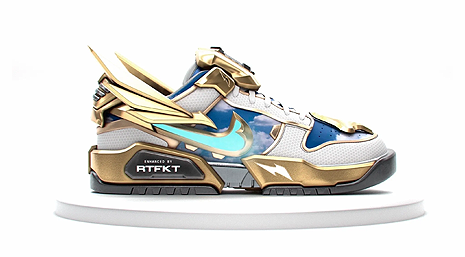
CryptoKicks, made by Nike & RTFKT, are one of the best examples of how a properly implemented NFT collection can drive brand awareness and interest, and vice versa. Since most usable assets in the metaverse come as NFTs, it’s crucial to arm yourself with the power of non-fungible tokens to provide three-dimensional brand interaction experiences.
ICODA digital marketing agency offers high-quality NFT development services that can unlock your brand’s true metaverse potential. Contact ICODA now to kickstart your metaverse marketing.
Buy Up Virtual Land
Pretty much every metaverse is divided into a finite number of land plots. As more and more people join into the new virtual reality, virtual land becomes increasingly expensive by the day. Investing in well-positioned NFT land plots will both prove a worthy investment and allow for creative freedom for you and your customers.
User Experience
Simply showing off your new product line won’t get you too far. What really makes a difference in a metaverse marketing strategy is gamified interactive experiences. Users want to score points, face challenges, be pushed to the edge of their creative capacity, and ultimately feel rewarded for doing so.
Make Use of Augmented Reality
The popularity of AR in the metaverse is on the rise. The most common use for it is dressing rooms in fashion brands, but you can go well beyond that. Just think about how your brand could benefit from augmented reality, and make sure to include that experience in your metaverse marketing strategy.
Sell Branded Items for Digital Avatars
One could make a point that an NFT handbag is useless compared to a physical one, but that doesn’t prevent virtual bags and accessories by Gucci, Digital Couture, et al., from being bought and sold for thousands of dollars per piece.
Brand digital assets are crucial to your metaverse marketing campaign, and your content doesn’t even have to be unique to sell well. NFT accessories can well be the exact replicas of their real-world counterparts.

A digital replica of the Gucci Dionysus bag went for $4,115 in Roblox, an online gaming metaverse. The cost of the real thing is $3,400.
Balance Interactive Ads With Native Advertisement
After buying another plot of digital land, you will be tempted to flood it with banners, leaflets, and other types of native ads wherever the user goes. However, what really matters is the balance between native and interactive ads.
To strike the golden mean, ask yourself about what exact purpose this or that element of native advertising serves and how it can work or interfere with the interactive experiences.
The Challenges of Metaverse Marketing
It’s worth taking into account that the metaverse field is still nascent and faces an array of challenges that it will have to overcome before becoming a worldwide thing.
Data Privacy and Security
Even though the metaverse is based on a blockchain, which is a fairly secure way to store and exchange information, there are still gaps in user data security within a given metaverse. A data breach or leak of any kind could tarnish or even ruin a brand’s reputation both within the metaverse and IRL.
When planning a marketing strategy for the metaverse, make sure your data security is up to par. You can do that with the help of the ICODA blockchain development agency. Contact ICODA now for quality data security services.
A Cryptic User Experience
Cryptocurrency is still impenetrable to most people. Dealing with digital assets involves a level of technology awareness that isn’t taught in the traditional financial systems, so most mainstream brand consumers won’t be ready to dive into the metaverse headfirst.
What’s more, even those who do understand how crypto payments work doesn’t always see how they would apply them to their everyday lives.
The challenge for any brand delving into the metaverse would be not only to advertise itself but also to educate and assist its customers in matters of accessing crypto and the blockchain in general.
Ownership & Legal Issues
There’s a lot of argument surrounding whether or not something on a blockchain actually belongs to you (spoiler alert: not really). So many people will naturally have issues realizing that their digital assets, should there be a data breach or a plain theft, could easily be lost for good without a chance to retrieve them.
Moreover, as the world of crypto is not bound to any particular legislation, it enables all manner of behaviors that can be easily considered offensive and/or illegal. Therefore, it’s up to the brands to manage their virtual communities in a way that accounts for the legal rights and ethical principles of the members of those communities and ensures rules that protect those rights.
Final Thoughts About Metaverse Marketing
The concept of a metaverse isn’t new. It was first introduced back in the 90s in sci-fi circles. Ever since 2019-2020, there’s been an uproar in the popularity of metaverses, which also enabled many brands to expand their marketing into the thriving virtual worlds. However, the metaverse still remains a place primarily for those ‘in’ on the blockchain and crypto, and it still has to overcome some major challenges before going truly worldwide.
Kickstart Your Metaverse Marketing With ICODA
If you feel like your brand needs metaverse marketing — look no further than ICODA. It is a multinational team of blockchain developers and marketing experts with a year-long, proven experience in the field. With ICODA, you will tailor your marketing campaign to your budget in the most cost-efficient way. You will also gain invaluable insight into the intricacies of blockchain marketing, which will help you further strengthen your brand’s presence both in the metaverse and IRL. Contact ICODA to start your successful metaverse journey now.
